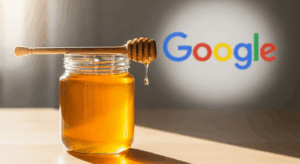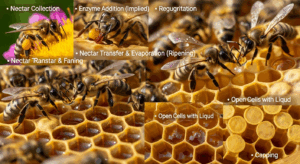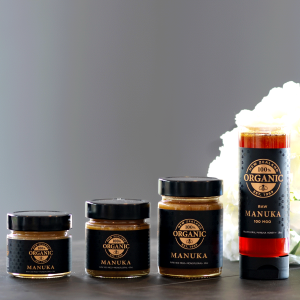Unlocking the Golden Secrets:
Your Top Honey Questions Answered by Bee-Licious Honey!
At Bee-Licious Honey, we’re passionate about bringing you the finest, most unique honeys from around the globe. But beyond the exquisite flavors and aromas, we know you might have some buzzing questions about this incredible natural wonder! We’ve noticed what the world is curious about, and we’re here to share the golden truths behind nature’s sweet gift.
Here at Bee-Licious Honey, we address The Top Googled Questions About Honey to ensure you’re informed and satisfied.
Let’s dive into some of the most frequently asked questions about honey:
1. Why Does My Honey Crystallize, and is it Still Good?
Have you ever noticed your beautiful, clear honey turning cloudy or developing a granular texture? Don’t fret! Honey crystallization is a completely natural process, and it’s actually a sign of pure, high-quality honey. This happens when glucose separates from the water in the honey, forming crystals. Factors like temperature, glucose content, and whether the honey is unfiltered can all influence how quickly it crystallizes.
Bee-Licious Insight: Many of our raw, unprocessed honeys, sourced from diverse regions, may crystallize. For example, some honeys with higher glucose content will crystallize faster. This natural transformation doesn’t mean your honey has gone bad! Simply warm the jar gently in a water bath or place it in warm sunlight to return it to its liquid state.
2. Does Honey Ever Expire?
Here’s a sweet surprise: properly stored honey practically lasts forever! Its low moisture content and acidic pH create an inhospitable environment for bacteria and microorganisms, preventing spoilage. Archaeologists have even discovered edible honey in ancient Egyptian tombs! While honey can darken or crystallize over time, it remains safe to consume indefinitely when stored in a sealed container at room temperature.
3. Can I Give Honey to My Pet?
This is a common question, and the answer is generally yes for dogs, in moderation. Raw, unprocessed honey is often considered the best option for dogs as it retains its natural nutrients. However, it’s always best to consult your veterinarian before introducing any new food into your pet’s diet.
4. How Do Bees Actually Make Honey?
The journey from flower nectar to the delectable honey in your jar is a marvel of nature!
-
Nectar Collection: Bees collect nectar from flowers using their specialized tongues, storing it in a “honey stomach”.
-
Enzyme Addition: Inside their bodies, enzymes begin to break down the nectar’s complex sugars.
-
Nectar Transfer & Evaporation: Back at the hive, worker bees repeatedly regurgitate and fan the nectar with their wings. This process, known as “ripening,” adds more enzymes and evaporates excess water, making the honey stable for storage.
-
Capping: Once the nectar thickens into honey, the bees cap the cells with beeswax, preserving it for future use.
5. Is Honey Safe for Infants?
It’s crucial to remember that honey should never be given to infants under one year old. Honey can contain spores of Clostridium botulinum, which can cause infant botulism, a serious illness that an infant’s digestive system is not mature enough to handle. After the age of one, a child’s digestive system is typically developed enough to safely process honey.
6. How Many Calories Are in Honey?
Honey is a calorie-dense sweetener, containing approximately 300 calories per 100g. While it offers more nutritional benefits than refined sugar due to its vitamins, minerals, and antioxidants, it should still be consumed in moderation, especially if you’re watching your caloric intake.
7. Which Honey is “Best”?
The “best” honey truly depends on your preferences and needs! At Bee-Licious Honey, we pride ourselves on curating a diverse range of superior and unique honeys from around the globe, each with its own distinct character.
-
Manuka Honey: Renowned for its strong antibacterial properties, often sought for medicinal uses. You can explore our Springbank Manuka Honey.
-
Raw Honey: Unprocessed and unfiltered, it retains most of its natural enzymes and nutrients. Many of our artisanal honeys are raw, offering you the pure essence of nature.
-
Acacia Honey: Known for its light, delicate flavor and slow crystallization. Discover our Spanish Acacia Honey.
-
Forest Honeydew Honey: A unique honey not from flower nectar but from the honeydew secreted by insects on plants, offering rich, earthy notes.
-
Fireweed Honey: Fondly referred to as the “champagne” of honeys it’s a light amber color with a mild delicate taste with buttery notes of vanilla and citrus.
Exploring different honeys, like our Nepal Himalayan Cliff Honey or Alemany Rosemary Honey, allows you to discover a world of flavors and find your personal favorite.
Discover the Magic of Bee-Licious Honey
We hope these answers have clarified some of the mysteries surrounding honey! At Bee-Licious Honey, we celebrate the incredible power of the honeybee and the natural benefits of pure, high-quality honey. We carefully source the finest varietals from trusted beekeepers here locally in Oregon and worldwide, ensuring every jar delivers smooth, rich flavors.
Ready to explore the diverse and delicious world of honey? Visit our products page to find your next favorite jar!






